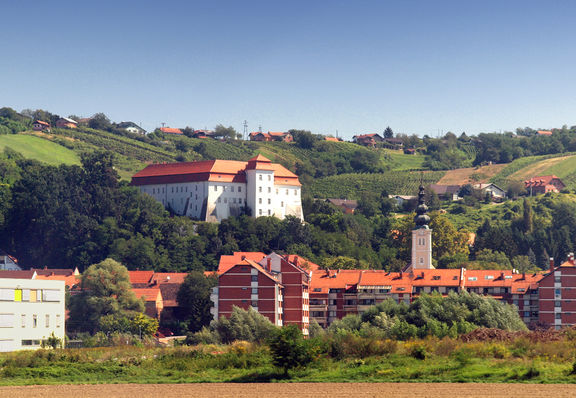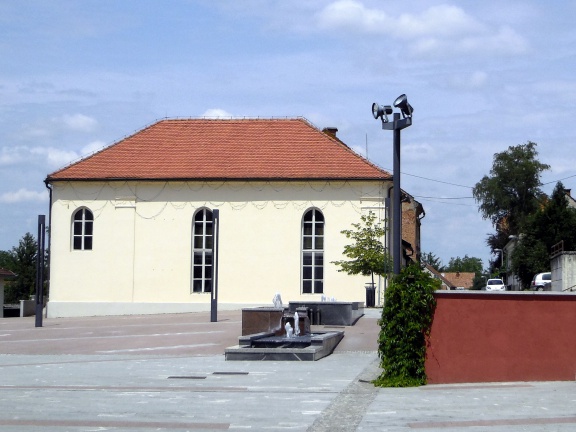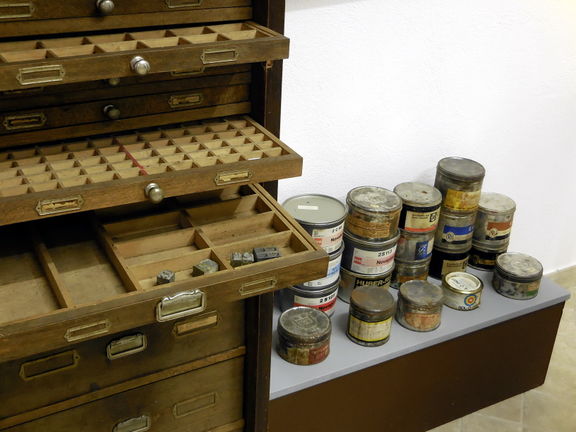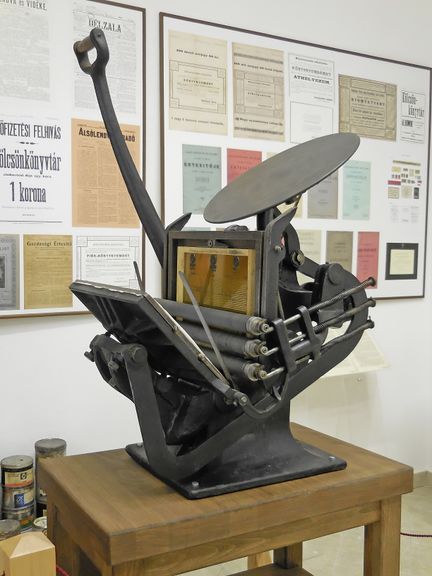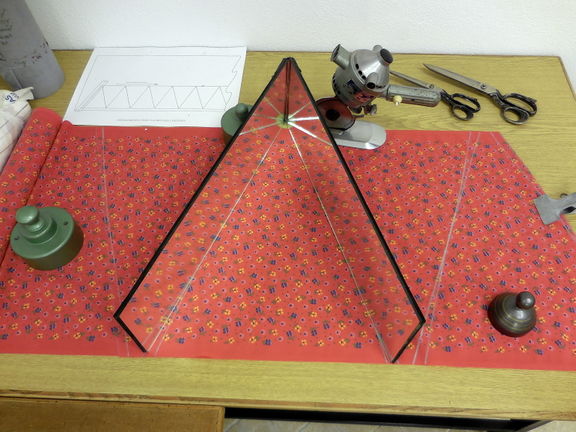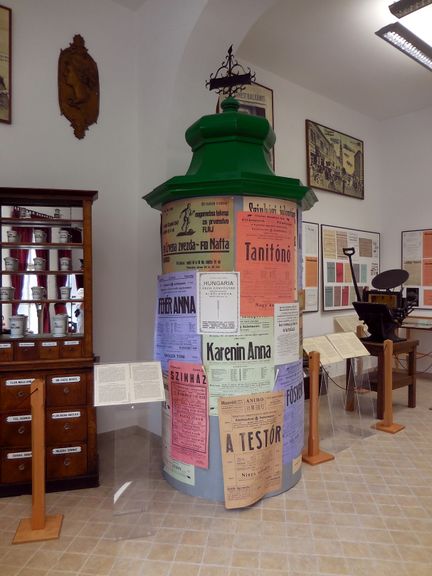Difference between revisions of "Lendava-Lendva Gallery and Museum"
(TW FB) |
(dead link) |
||
| (6 intermediate revisions by 2 users not shown) | |||
| Line 8: | Line 8: | ||
| street = Banffyjev trg 1 | | street = Banffyjev trg 1 | ||
| town = SI-9220 Lendava-Lendva | | town = SI-9220 Lendava-Lendva | ||
| + | | map = http://www.openstreetmap.org/?lon=16.45272&lat=46.56692&zoom=17&layer=mapnik | ||
| telephone = 386 (0) 2 578 9260 | | telephone = 386 (0) 2 578 9260 | ||
| − | | fax = | + | | fax = |
| email = info@gml.si | | email = info@gml.si | ||
| website = http://www.gml.si/ | | website = http://www.gml.si/ | ||
| Line 15: | Line 16: | ||
| founded by 2 = Hungarian National Self-Governing Community of Pomurje Region Lendava-Lendva | | founded by 2 = Hungarian National Self-Governing Community of Pomurje Region Lendava-Lendva | ||
| contacts = {{Contact | | contacts = {{Contact | ||
| − | | name = | + | | name = Dubravko Baumgartner |
| role = Director | | role = Director | ||
| − | | telephone = 386 (0) 2 578 | + | | telephone = 386 (0) 2 578 9261 |
| − | | email = | + | | email = dubi@gml.si |
}} | }} | ||
|accounts= | |accounts= | ||
| Line 49: | Line 50: | ||
Since 2008 another memorial room has been dedicated to [[Štefan Galič]] (1944–1997), the academic painter and graphic artist, born in Lendava. Galič was an appraised master of the woodcutting techniques. The artists' collection of over 4,000 butterflies is also on display. | Since 2008 another memorial room has been dedicated to [[Štefan Galič]] (1944–1997), the academic painter and graphic artist, born in Lendava. Galič was an appraised master of the woodcutting techniques. The artists' collection of over 4,000 butterflies is also on display. | ||
| + | ===Glavna ulica 52=== | ||
The museum manages also the dislocated unit in Lendava town, where the exhibition ''Citizenship, Typography and Umbrella Manufacturing in Lendava'' is on display. The bourgeois class life is illustrated with a work room and a saloon of a lawyer family and with pharmacy equipment of the late 19th century. In the next room the development of Lendava typography is presented, from the beginnings in 1573, when the first book was printed on the Slovenian territory in Lendava, to the golden age of printing related to Gábor Kardos and Ernő Balkány at the turn from the 19th to the 20th century. The third room presents the umbrella factory ''Hungária Hazai Ernyőgyár Rt.'', the first in the Austro-Hungarian Empire, which developed in 1904 from the Béla Wortman dressmaking factory. The exhibition was prepared in collaboration with the Széchenyi National Library from Budapest. | The museum manages also the dislocated unit in Lendava town, where the exhibition ''Citizenship, Typography and Umbrella Manufacturing in Lendava'' is on display. The bourgeois class life is illustrated with a work room and a saloon of a lawyer family and with pharmacy equipment of the late 19th century. In the next room the development of Lendava typography is presented, from the beginnings in 1573, when the first book was printed on the Slovenian territory in Lendava, to the golden age of printing related to Gábor Kardos and Ernő Balkány at the turn from the 19th to the 20th century. The third room presents the umbrella factory ''Hungária Hazai Ernyőgyár Rt.'', the first in the Austro-Hungarian Empire, which developed in 1904 from the Béla Wortman dressmaking factory. The exhibition was prepared in collaboration with the Széchenyi National Library from Budapest. | ||
| Line 56: | Line 58: | ||
The gallery hosts many temporary exhibitions and regularly presents the new artworks made at the [[Lendava-Lendva International Fine Arts Colony]] and the [[LindArt International Young Artists’ Fine Arts Colony]]. György Ezüst, the head of a similar colony in Budapest, and Imre Makovecz (1935), the architect of the [[Lendava-Lendva Institute for Culture and Promotion (ZKPL-MPIL)|Lendava Culture House]], both exhibited here in 2009. The gallery promotes local artists and organises their exhibitions abroad (recently with partners in Monošter, Zalaegerszeg, Budapest, and Vienna). | The gallery hosts many temporary exhibitions and regularly presents the new artworks made at the [[Lendava-Lendva International Fine Arts Colony]] and the [[LindArt International Young Artists’ Fine Arts Colony]]. György Ezüst, the head of a similar colony in Budapest, and Imre Makovecz (1935), the architect of the [[Lendava-Lendva Institute for Culture and Promotion (ZKPL-MPIL)|Lendava Culture House]], both exhibited here in 2009. The gallery promotes local artists and organises their exhibitions abroad (recently with partners in Monošter, Zalaegerszeg, Budapest, and Vienna). | ||
| − | On the other hand the gallery presents also more ambitious international exhibition projects such as the works by Alfons Mucha from the Zdeněk Třímal's collection or the ''Shunga – Erotic in Japanese Art'', prepared by András Morgós, researcher, restorer, and professor at the Fine Art University in Tokyo (both in 2011). | + | On the other hand the gallery presents also more ambitious international exhibition projects such as the works by Alfons Mucha from the Zdeněk Třímal's collection or the ''Shunga – Erotic in Japanese Art'', prepared by András Morgós, researcher, restorer, and professor at the Fine Art University in Tokyo (both in 2011). In 2014 Goya's ''Caprichos'' from the Richard H. Mayer collection were on display. |
== See also == | == See also == | ||
| Line 68: | Line 70: | ||
* [http://www.pok-muzej-ms.si/?jezik=slo&vsebina=dok&id=92 Oloris exhibition web page] | * [http://www.pok-muzej-ms.si/?jezik=slo&vsebina=dok&id=92 Oloris exhibition web page] | ||
* [http://www.pomurje.si/turizem/muzeji/galerija-muzej-lendava-galeria-muzeum-lendva/ About Lendava-Lendva Gallery and Museum] (in Slovenian) | * [http://www.pomurje.si/turizem/muzeji/galerija-muzej-lendava-galeria-muzeum-lendva/ About Lendava-Lendva Gallery and Museum] (in Slovenian) | ||
| − | |||
| − | |||
* [http://en.wikipedia.org/wiki/Imre_Makovecz Imre Makovecz on Wikipedia] | * [http://en.wikipedia.org/wiki/Imre_Makovecz Imre Makovecz on Wikipedia] | ||
| − | |||
| Line 80: | Line 79: | ||
[[Category:Visual arts museums]] | [[Category:Visual arts museums]] | ||
[[Category:Visual arts]] | [[Category:Visual arts]] | ||
| + | [[Category:Municipal cultural institutions]] | ||
Latest revision as of 19:41, 17 December 2018
-
to
19 Oct 2018
16 Nov 2018
Unknown Proximity, an exhibition of Slovenian contemporary painting, featuring works of a number of Slovene artists, with the introduction by Atilla Pisnjak (Lendava-Lendva Gallery and Museum), organised by the Lendava-Lendva Gallery and Museum in cooperation with the Embassy of the Republic of Slovenia Budapest,
-
to
7 Aug 2015
27 Sep 2015
Masters and their masters – Tradition and continuity in Slovenian painting, an exhibition featuring works of a number of Slovene artists, curated by Milček Komelj (Slovene Academy of Sciences and Arts (SAZU)), organised by the Lendava-Lendva Gallery and Museum in cooperation with the Embassy of the Republic of Slovenia Budapest and the Academy of Fine Arts and Design,
-
to
13 Dec 2013
27 Jan 2014
An exhibition featuring selected bronze sculptures from the International Fine Arts Colony Lendava, co-organised by the Lendava-Lendva Gallery and Museum and supported by the Embassy of the Republic of Slovenia Budapest,
-
to
12 Mar 2013
26 Mar 2013
An exhibition by Dubravko Baumgartner, organised in co-operation with the Lendava-Lendva Gallery and Museum
Background
The merit of the establishment of the institution goes to local sculptor Ferenc Király, a winner of the prestigious Hungarian Munkácsy Award in 2005, who also initiated the Lendava-Lendva International Fine Arts Colony in 1973 and was its director and the artistic director of the colony for 22 years, until his retirement in 1995. At first the Lendava Gallery and Museum acted as part of the Cultural Community Lendava and in 1979 it came under the Institute for Culture Lendava. In 1996, the new and continuing director of the Lendava Gallery and Museum, Franc Gerič, succeeded in setting it up as an independent public institution.
Exhibitions
Museum
The Oloris exhibition was set up in 1991 and occupies the first floor of Lendava Castle. It presents the Bronze Age settlement of Oloris near Dolnji Lakoš. The location was researched and excavated in the 1980s by the Murska Sobota Regional Museum and Institute of Archaeology. The material from the interiors of the dwellings from the courtyard and fringes of the settlement is displayed and enhanced by a reconstructed house with a hearth and loom, and a courtyard with oven, well, fence and fields, including stone farming tools.
The historical exhibition The Castle Lies in Wait [Grad na preži] was prepared in cooperation with the Institute and Museum of Military History, Budapest. It informs us about the Turks' invasions of the territory, about a union of castles which formed the so-called Military Region. Part of the Military Region comprised the Lendava Castle, which the Turks never managed to conquer. The exhibition presents the replicas of weapons, equipments of soldiers, the flags and the images of the Lendava, Beltinci, Kaniža, Novi Zrin, and Beograd castles at that time.
The numismatic exhibition A Thousand Years of Forging Money in Hungary, donated by the National Museum, Budapest, presents the development of Hungarian currency.
The museum has a rich ethnological collection, of which only a part is exhibited in the left wing on the upper floor of the castle. It presents dwellings, as well as spiritual and aesthetic world of the ancestors of Prekmurje, i.e., painted chests (tulipánoslada), blacksmith bellows, decorative towels, pottery, and religious statues.
The György Zala Memorial Room is dedicated to György Zala (1858–1937), one of Hungary's most eminent neo-Baroque sculptors of the 19th century, who was born in Lendava. Zala was an excellent portraitist and the author of the monumental sculptures of kings and emperors at Hósök tere (Heroes' Square) in Budapest.
Since 2008 another memorial room has been dedicated to Štefan Galič (1944–1997), the academic painter and graphic artist, born in Lendava. Galič was an appraised master of the woodcutting techniques. The artists' collection of over 4,000 butterflies is also on display.
Glavna ulica 52
The museum manages also the dislocated unit in Lendava town, where the exhibition Citizenship, Typography and Umbrella Manufacturing in Lendava is on display. The bourgeois class life is illustrated with a work room and a saloon of a lawyer family and with pharmacy equipment of the late 19th century. In the next room the development of Lendava typography is presented, from the beginnings in 1573, when the first book was printed on the Slovenian territory in Lendava, to the golden age of printing related to Gábor Kardos and Ernő Balkány at the turn from the 19th to the 20th century. The third room presents the umbrella factory Hungária Hazai Ernyőgyár Rt., the first in the Austro-Hungarian Empire, which developed in 1904 from the Béla Wortman dressmaking factory. The exhibition was prepared in collaboration with the Széchenyi National Library from Budapest.
Gallery
The collection of the Lendava-Lendva International Fine Arts Colony presents the works by local and European artists who have participated in the colonies since 1972 with the emphasis on the works made in the museum's own bronze casting foundry which has been operating since 2005.
The gallery hosts many temporary exhibitions and regularly presents the new artworks made at the Lendava-Lendva International Fine Arts Colony and the LindArt International Young Artists’ Fine Arts Colony. György Ezüst, the head of a similar colony in Budapest, and Imre Makovecz (1935), the architect of the Lendava Culture House, both exhibited here in 2009. The gallery promotes local artists and organises their exhibitions abroad (recently with partners in Monošter, Zalaegerszeg, Budapest, and Vienna).
On the other hand the gallery presents also more ambitious international exhibition projects such as the works by Alfons Mucha from the Zdeněk Třímal's collection or the Shunga – Erotic in Japanese Art, prepared by András Morgós, researcher, restorer, and professor at the Fine Art University in Tokyo (both in 2011). In 2014 Goya's Caprichos from the Richard H. Mayer collection were on display.
See also
- Lendava-Lendva International Fine Arts Colony
- LindArt International Young Artists’ Fine Arts Colony
- Lendava Castle
- Lendava-Lendva Institute for Culture and Promotion (ZKPL-MPIL)
External links
- Lendava-Lendva Gallery and Museum web page
- Oloris exhibition web page
- About Lendava-Lendva Gallery and Museum (in Slovenian)
- Imre Makovecz on Wikipedia



